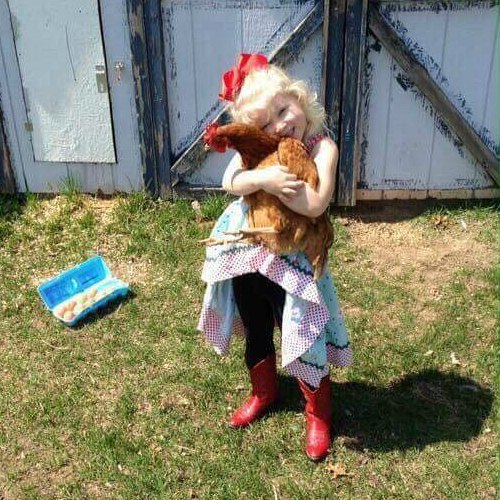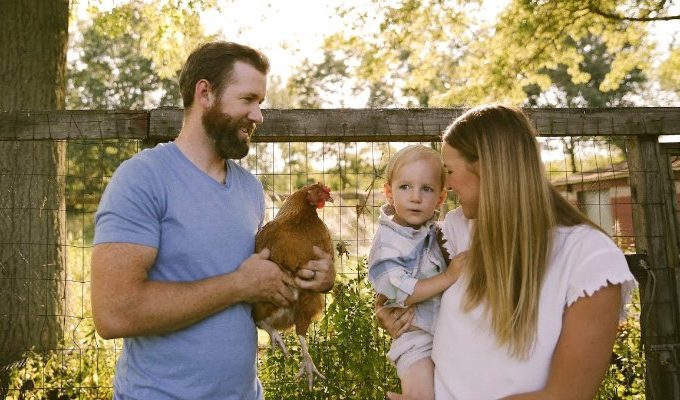I’m a Backyard Farmer Raising Chickens in Michigan
I married into a family that farms. I am not, by any means, a farmer.
Canning, gardening, and farm animals were all very foreign to me.
I’ve come a long way since then and now am the proud owner of my third or fourth round of backyard chickens.
Raising Chickens is a Family Decision
Chickens are just like owning any other animal, but it can be hard to know where to start and what you need.
We’re hoping we can lay it out simply and you can be on your way to fresh eggs for breakfast!
Getting the Kids Involved with Chickens
This is where the fun starts! My preschooler loves helping me check for eggs and bringing them (so very carefully!) in the house. As he gets older, I’m hoping he’ll like cleaning out the coop too.
Just like any family pet, it offers lots of opportunities to teach kids about responsibility. Chickens also give way to beneficial conversations about where our food comes from.
If you’re not sold on raising your own chickens, places like Blandford Nature Center and The Critter Barn offer fun, interactive options for your children to get a taste of what it’s like to have a farm animal…without turning your home into the farm.
Learn the Rules for Your Area Before Raising Chickens at Home
First Things First: Follow the Law of the Land
Depending on where you live, you may not be able to have chickens.
Please check your local ordinance rules about farm animals. The City of Grand Rapids requires a permit and you must meet certain criteria in order to own chickens – like having the approval of adjacent neighbors and paying a $53 application fee.
It’s also considerate to check with your neighbors even if it isn’t required by regulation; chickens can be noisy and stinky. Maybe bribe them with any extra eggs for their cooperation!
Where to Get Chickens?
Where Can You Buy Chickens?
You’d be surprised where you can pick up chickens in the Grand Rapids area.
You don’t need to know a farmer; you can grab chicks at any Family, Farm, and Home or Tractor Supply store.
They’ll also carry any supplies you may need to get started.
If you get chicks, you’ll need to start them inside as it’s usually too cold to keep them outside in early spring.
A cardboard box with tall sides or a Rubbermaid tote and a heat lamp is all you’ll need for their temporary shelter.

Getting Set Up to Raise Chickens
Creating a Safe Coop Against Weather and Predators
As they grow, they’ll need some sort of permanent shelter.
The general suggestion is at least 3 square feet of inside space and 10 square feet of outdoor space per chicken. There are lots of fun coop options these days, but you’ll want to make sure it’s predator-proof.

It’s important that your coop is entirely enclosed and you make sure your chickens are safely locked in at night.
For your run (your outdoor area) you can bury a portion of the fencing underground to keep out digging predators. We’ve found that most Michigan predators are good climbers, so putting tree netting, chicken wire, or a roof on top of your fenced-in run is helpful too.
We’ve lost many chickens (even when we lived in a neighborhood in Kentwood) to predators.
Raccoons, opossums, and foxes are constantly searching for vulnerable animals and weak points in your coop. Coyotes are also a growing problem in rural areas in Michigan–and they certainly have an appetite for chicken.
While “free-range” is a buzzword in the world of eggs, it could mean a short life span for a chicken in West Michigan.

When Do Chickens Lay Eggs?
You’ll Have to Wait for Eggs
It does take some time for your chickens to start laying eggs.
Don’t get discouraged if you don’t see them as quickly as you’d like! If you purchase chicks in early spring, you should see eggs by the middle of autumn (about 24 weeks).
You should be getting about one egg a day per chicken at their peak. In my experience, chickens will lay nicely for 2-3 years before their egg production slows or stops. There are also some theories that chickens lay more if you have a rooster (but roosters can be aggressive and make more noise than chickens).
Can You Raise Chickens in Michigan in the Winter?
Chickens in the Michigan Climate
Chickens, once full grown, are surprisingly hearty.
When winter sets in, you don’t need to do anything, in particular, to keep them warmer. They tend to stay in the coop more in the winter (they know they won’t find many treats in the snow), so we keep our coop stocked with fresh straw so they’re cozy.
We also use a water heater to keep their water from freezing (you could also refill or check their water more frequently, but this has been helpful for us).
Egg production takes a dive in the winter.
Not even chickens have the motivation to get anything done in the chilly, winter months! Ours occasionally stop laying entirely, but you will at least see a decline in eggs (and might even have to buy some from the store).
Resources for Raising Chickens
Helpful Backyard Chicken Resources
There’s much more out there to know and learn when it comes to backyard chickens; here are some books and websites that have been helpful to me along the way!
We also frequent the Backyard Chickens website looking for answers to any questions we may have (and often find others who have already had the same questions).


Is there a height requirement for fencing? My neighbor has decided to raise chickens and roosters and they are ALWAYS flying over the fence into our yard (in fact they are rarely on their side).
Am I allowed to request that they install a 10 foot fence to keep them over there?